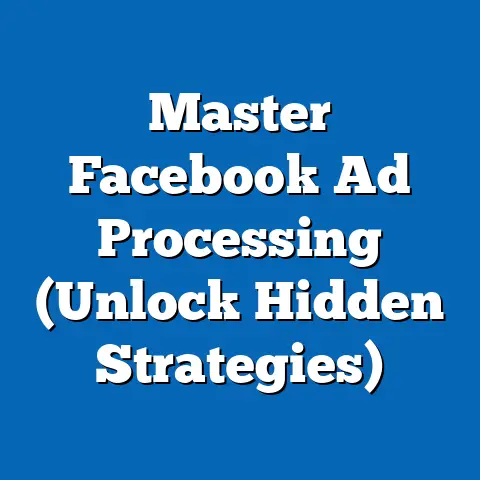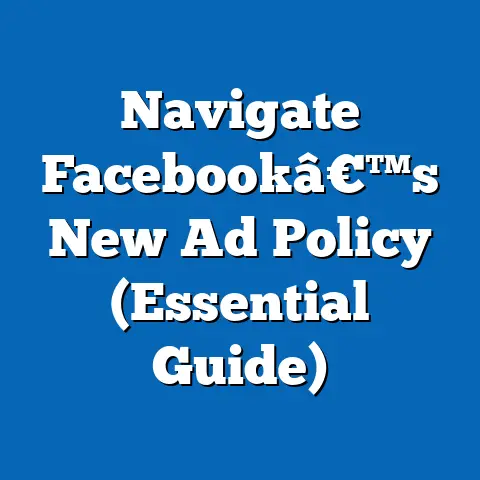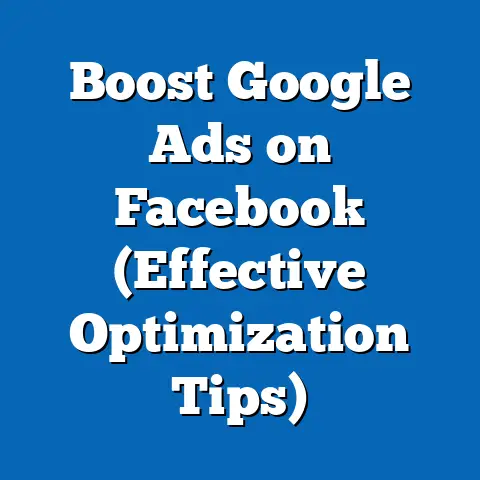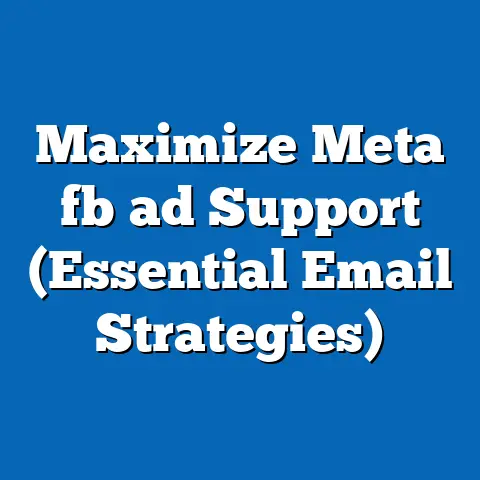Conquering Facebook Ad Account Deletion (Strategic Solutions)
Why did the marketer break up with his Facebook ad account? It kept ghosting him with account deletions! (I always find a little humor helps ease the tension, and let’s face it, dealing with Facebook ad account issues can be stressful.)
Facebook Ads have become an indispensable tool for businesses and marketers aiming to reach a vast and diverse audience. In fact, as of Q4 2023, Facebook reported over 3 billion monthly active users, showcasing the immense potential for businesses to connect with their target demographic. Having a well-optimized and actively managed ad account is crucial for driving traffic, generating leads, and ultimately, boosting sales.
However, the path to successful Facebook advertising isn’t always smooth. One of the most daunting challenges that marketers face is the dreaded ad account deletion. Imagine pouring hours into crafting the perfect campaign, only to have your account suddenly shut down. The implications can be severe, leading to loss of revenue, disruption of marketing strategies, and potential damage to brand reputation.
Understanding Facebook Ad Account Deletion
Let’s start by defining what we’re talking about. A Facebook ad account deletion occurs when Facebook permanently disables your ad account, preventing you from running ads on their platform. This can happen for a variety of reasons, but it generally boils down to violating Facebook’s advertising policies or engaging in suspicious activity.
Common Reasons for Account Deletion
- Policy Violations: This is the most frequent culprit. Facebook has strict advertising policies covering everything from prohibited content (like hate speech or misleading claims) to restricted content (like alcohol or gambling ads, which require prior authorization).
- Suspicious Activity: If Facebook detects unusual activity on your account, such as sudden spikes in ad spend or login attempts from unfamiliar locations, it may flag your account for potential fraud.
- Payment Issues: Problems with your payment method, such as expired cards or insufficient funds, can also lead to account suspension and eventual deletion.
- Poor Ad Quality: Running ads with low engagement rates or negative feedback can signal to Facebook that your ads are not providing value to users, leading to account scrutiny.
- Circumventing Systems: Trying to bypass Facebook’s ad review process or using cloaking techniques to show different content to Facebook than to users is a surefire way to get your account banned.
Implications of Account Deletion
The consequences of having your ad account deleted can be far-reaching:
- Loss of Revenue: Without the ability to run ads, your business may experience a significant drop in traffic, leads, and sales.
- Disruption of Marketing Strategies: Ad account deletion throws a wrench into your marketing plans, forcing you to scramble for alternative strategies.
- Damage to Brand Reputation: If your ads are consistently flagged for violations, it can tarnish your brand’s image and erode customer trust.
- Lost Data and Insights: You lose access to valuable data and insights about your audience and ad performance, hindering your ability to make informed marketing decisions.
- Time and Resources Wasted: The time and resources spent setting up and managing your ad account go down the drain, forcing you to start from scratch.
The Scale of the Problem
While Facebook doesn’t publicly release specific statistics on ad account deletions, anecdotal evidence and industry reports suggest that it’s a widespread issue. I’ve personally seen numerous businesses, both large and small, struggle with account suspensions and deletions. The ever-evolving nature of Facebook’s policies and the increasing sophistication of detection algorithms mean that even experienced marketers can fall victim to account shutdowns.
Key Takeaway: Understanding the reasons behind ad account deletion and the potential consequences is the first step in protecting your advertising efforts.
Proactive Measures to Prevent Account Deletion
Adhere to Facebook’s Advertising Policies
This may seem obvious, but it’s worth emphasizing. Thoroughly familiarize yourself with Facebook’s advertising policies and ensure that all your ads comply with them. These policies are comprehensive and cover a wide range of topics, including:
- Prohibited Content: This includes content that is illegal, discriminatory, misleading, or offensive. Examples include hate speech, fake news, and deceptive health claims.
- Restricted Content: This includes content that is allowed under certain conditions, such as alcohol, gambling, and dating services. These types of ads typically require prior authorization from Facebook.
- Personal Attributes: Ads cannot directly or indirectly assert or imply personal attributes, such as race, ethnicity, religion, sexual orientation, or medical condition. For example, an ad targeting people with diabetes cannot say “Are you diabetic?”
- Misleading or Deceptive Claims: Ads must be truthful and accurate. Avoid making unsubstantiated claims or exaggerating the benefits of your products or services.
- Grammar and Punctuation: Ads should be well-written and free of grammatical errors. Poor grammar can make your ads look unprofessional and may even trigger Facebook’s algorithms.
Example of a Policy Violation:
I once worked with a client who was running ads for a weight loss product. They used before-and-after photos in their ads, which is generally allowed. However, they made explicit claims about the amount of weight people could lose in a specific timeframe. This violated Facebook’s policy against making unsubstantiated health claims, and their ad account was quickly suspended.
How to Avoid Policy Violations:
- Read the Policies: Seriously, take the time to read through Facebook’s advertising policies. They are regularly updated, so it’s a good idea to review them periodically.
- Use the Policy Checker: Facebook provides a policy checker tool that allows you to scan your ad copy and creative for potential violations.
- Err on the Side of Caution: If you’re unsure whether your ad complies with Facebook’s policies, it’s better to err on the side of caution and revise it.
- Monitor Your Ads: Keep a close eye on your ads and address any issues promptly. If you receive a notification that your ad has been disapproved, take the time to understand why and make the necessary changes.
Create a Strong Account Structure
The way you structure your ad account can also impact your risk of deletion. A well-organized account with a clear history of compliance is less likely to be flagged for suspicious activity.
- Use Clear Naming Conventions: Use consistent and descriptive naming conventions for your campaigns, ad sets, and ads. This makes it easier to track performance and identify any potential issues.
- Segment Your Audiences: Segment your audiences based on demographics, interests, and behaviors. This allows you to tailor your ads to specific groups of people, increasing engagement and reducing the risk of negative feedback.
- Maintain a Healthy Account History: Consistently run ads that comply with Facebook’s policies and avoid making drastic changes to your account settings. This helps build a positive reputation with Facebook.
- Monitor Account Metrics: Keep a close eye on your account metrics, such as ad spend, reach, and engagement. Unusual spikes or drops in these metrics can be a sign of suspicious activity.
Establish a Business Manager Account
Facebook Business Manager is a powerful tool that allows you to manage your ad accounts, pages, and other business assets in one place. Using Business Manager can provide several benefits in terms of account security and control:
- Centralized Management: Business Manager allows you to manage multiple ad accounts and pages from a single dashboard.
- Granular Permissions: You can assign different roles and permissions to team members, limiting their access to sensitive information and preventing unauthorized changes.
- Enhanced Security: Business Manager offers enhanced security features, such as two-factor authentication, which can help protect your account from hackers.
- Account Recovery: If your ad account is deleted, Business Manager can provide a pathway for recovery, especially if you have multiple administrators and verified business information.
My Experience with Business Manager:
I’ve seen firsthand how Business Manager can be a lifesaver. A client of mine had their personal ad account (the one linked directly to their personal Facebook profile) deleted due to a misunderstanding. Because they had their business assets managed through Business Manager, they were able to quickly create a new ad account within the Business Manager and resume their advertising efforts with minimal disruption.
Key Takeaway: Proactive measures, such as adhering to Facebook’s policies, creating a strong account structure, and using Business Manager, can significantly reduce your risk of ad account deletion.
Responding to Account Deletion
Despite your best efforts, your ad account may still be deleted. If this happens, it’s important to act quickly and strategically.
Immediate Actions to Take
- Don’t Panic: It’s easy to panic when you receive a deletion notice, but try to stay calm and focused.
- Gather Information: Collect all relevant information about your account, including your ad account ID, the date of deletion, and any notifications you received from Facebook.
- Review Policies: Carefully review Facebook’s advertising policies to identify any potential violations.
- Document Everything: Keep a record of all your communications with Facebook, including emails, chat logs, and screenshots.
Appealing the Decision
Facebook allows you to appeal ad account deletions. Here’s a step-by-step guide on how to do it:
- Go to the Account Quality Page: Navigate to the Account Quality page in Facebook Business Manager.
- Find the Deletion Notice: Locate the notice indicating that your ad account has been deleted.
- Click “Request Review”: Click the “Request Review” button to start the appeal process.
- Provide Information: Explain why you believe your account was deleted in error. Be clear, concise, and respectful.
- Submit Supporting Evidence: If you have any evidence that supports your case, such as screenshots of your ads or documentation of your business practices, include it in your appeal.
Tips for Writing an Effective Appeal:
- Be Concise: Get straight to the point and avoid rambling.
- Be Respectful: Maintain a professional and respectful tone throughout your appeal.
- Be Evidence-Based: Back up your claims with concrete evidence.
- Acknowledge Mistakes: If you made a mistake, acknowledge it and explain what steps you’ve taken to prevent it from happening again.
- Focus on the Future: Emphasize your commitment to complying with Facebook’s policies and providing value to users.
Utilizing Facebook Support
In addition to appealing the decision through the Account Quality page, you can also reach out to Facebook support for assistance.
- Contact Support: Use the Facebook Business Help Center to find contact information for Facebook support.
- Provide Information: When contacting support, be sure to provide all relevant information about your account and the deletion notice.
- Be Persistent: It may take some time to get a response from Facebook support. Be persistent and follow up regularly.
- Use Community Forums: Facebook’s community forums and groups can be a valuable resource for getting help and advice from other advertisers.
My Experience with Facebook Support:
I’ve found that Facebook support can be hit or miss. Sometimes, they are incredibly helpful and responsive. Other times, it can be difficult to get a clear answer or resolution. The key is to be persistent, polite, and provide as much information as possible.
Key Takeaway: If your ad account is deleted, take immediate action to gather information, appeal the decision, and utilize Facebook support.
Strategic Solutions for Account Recovery
Recovering a deleted ad account can be challenging, but it’s not impossible. Here are some strategic solutions that can increase your chances of success:
Analyzing Account Activity
Conduct a thorough analysis of your past ad performance and account activities to identify any potential issues that may have led to the deletion.
- Review Ad Performance: Look for ads that had low engagement rates, negative feedback, or policy violations.
- Check Account Settings: Verify that your account settings, such as your payment method and business information, are accurate and up-to-date.
- Investigate Suspicious Activity: Look for any signs of suspicious activity, such as unauthorized logins or unusual ad spend.
Engaging with the Facebook Ads Community
Connect with other advertisers and share your experiences to gain insights and support.
- Join Facebook Groups: There are many Facebook groups dedicated to Facebook advertising. These groups can be a valuable resource for getting help, advice, and feedback.
- Attend Industry Events: Attend industry events and conferences to network with other marketers and learn about the latest trends and best practices.
- Share Your Story: Share your story on social media or in online forums. You may be surprised by how many people have had similar experiences.
Learning from the Experience
Document your experiences and develop a checklist for future ad campaigns to avoid similar pitfalls.
- Create a Checklist: Develop a checklist of best practices for creating and managing Facebook ads.
- Document Your Processes: Document your ad creation and management processes to ensure consistency and compliance.
- Stay Updated: Stay up-to-date on Facebook’s advertising policies and best practices.
Key Takeaway: Recovering a deleted ad account requires a strategic approach that includes analyzing account activity, engaging with the Facebook ads community, and learning from the experience.
Case Studies and Success Stories
Let’s look at a couple of real-world examples of businesses that faced ad account deletion and successfully navigated the process:
Case Study 1: E-commerce Business
An e-commerce business selling handmade jewelry had their ad account deleted due to a misunderstanding about Facebook’s policy on personal attributes. Their ads featured images of people wearing their jewelry and included taglines like “Express your unique style.” Facebook flagged these ads for implying that people who didn’t wear their jewelry were not unique.
The business owner immediately appealed the decision, explaining that their intention was not to target any specific personal attributes but rather to promote self-expression. They also revised their ad copy to remove any potentially problematic language. After several days of back-and-forth with Facebook support, their ad account was reinstated.
Lessons Learned:
- Pay close attention to the language used in your ads and avoid making any claims that could be interpreted as targeting personal attributes.
- Be prepared to revise your ad copy and creative to comply with Facebook’s policies.
Case Study 2: Local Restaurant
A local restaurant had their ad account deleted due to suspicious activity. Their account was hacked, and the hackers ran unauthorized ads promoting fraudulent products.
The restaurant owner immediately contacted Facebook support and reported the hacking incident. They also provided evidence that they had taken steps to secure their account, such as changing their password and enabling two-factor authentication. After investigating the incident, Facebook reinstated their ad account and refunded the unauthorized ad spend.
Lessons Learned:
- Take steps to secure your account, such as using a strong password and enabling two-factor authentication.
- Monitor your account regularly for suspicious activity and report any incidents to Facebook support immediately.
Key Takeaway: These case studies demonstrate that ad account deletion is not always the end of the road. With the right approach and persistence, it’s possible to recover your account and resume your advertising efforts.
Conclusion
Understanding Facebook’s ad policies and taking proactive measures to avoid deletions is crucial for protecting your advertising efforts. By adhering to the policies, creating a strong account structure, and using Business Manager, you can significantly reduce your risk of ad account deletion.
If your ad account is deleted, don’t panic. Take immediate action to gather information, appeal the decision, and utilize Facebook support. Remember to analyze your account activity, engage with the Facebook ads community, and learn from the experience.
I encourage you to remain vigilant in your advertising efforts and to use the strategies discussed in this article to safeguard your ad accounts. With the right approach, you can conquer the challenges of Facebook ad account management and achieve your marketing goals.
Remember, even the most experienced marketers face challenges with Facebook advertising. The key is to stay informed, be proactive, and never give up. With the right strategies and a little bit of perseverance, you can conquer the challenges of Facebook ad account management and achieve your marketing goals.






